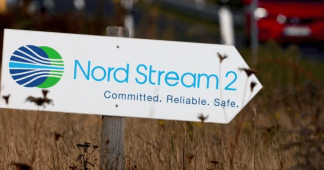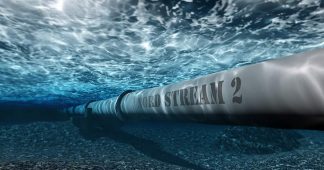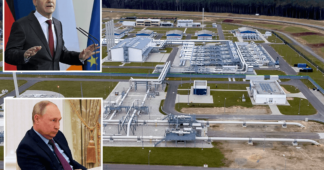The secretary of state says it’s an opportunity to remove Europe’s dependency on Russian energy
Posted on
Categories Secretary of State Antony Blinken said Friday that the attacks on the Nord Stream natural gas pipelines that connect Russia to Germany offer a “tremendous opportunity” to end Europe’s dependency on Russian energy.
“It’s a tremendous opportunity to once and for all remove the dependence on Russian energy and thus to take away from Vladimir Putin the weaponization of energy as a means of advancing his imperial designs,” Blinken said at a joint press conference with Canadian Foreign Minister Mélanie Joly.
“That’s very significant and that offers tremendous strategic opportunity for the years to come,” Blinken added.
According to @SecBlinken, the Nord Stream pipeline bombing "offers tremendous strategic opportunity for the years to come." Too bad that this tremendous opportunity for DC bureaucrats will come at the expense of everyone else, especially this coming winter. pic.twitter.com/T2eacQUuBF
— Aaron Maté (@aaronjmate) October 1, 2022
Blinken made the comments when asked what the US and Canada are doing to ease Europe’s energy crisis in the wake of the Nord Stream sabotage. Blinken said that Washington had been working for some time to provide Europe with more energy, and as a result, the US is now Europe’s biggest supplier of liquefied natural gas (LNG).
“And we’re now the leading supplier of LNG to Europe to help compensate for any gas or oil that it’s losing as a result of Russia’s aggression against Ukraine,” Blinken said.
Over the years, the US worked hard to oppose Nord Stream 2 by imposing sanctions but failed to stop its construction. The project was paused by Berlin on February 22 after Russian President Vladimir Putin ordered troops into the Donbas, an order that preceded the February 24 invasion.
There was always a chance Nord Stream 2 could be brought online if relations between Europe and Russia thawed, but now the damage could be irreparable. Russia recently stopped delivering gas through Nord Stream 1 as a result of Western sanctions.
At this point, it’s not clear who was behind the attacks on Nord Stream, but the US certainly has a motive. On Friday, Putin blamed the “Anglo-Saxons” for the incident, appearing to point the finger at the US and its allies.
“Sanctions are not enough for Anglo-Saxons. They have turned to sabotage, it’s unbelievable, but true, having organized explosions on the international gas pipelines of the Nord Stream,” the Russian leader said during a ceremony for the annexation of four Ukrainian territories.
The US has rejected the claim that it was behind the attack, and Western media is hinting that Russia was responsible even though the pipelines are mainly owned by Gazprom, Russia’s state gas company.
The Associated Press called the claim that the US was involved a “baseless conspiracy theory” that was being pushed by the Kremlin and Russian state media. But one of the most significant allegations came from Radek Sikorski, a former Polish Foreign Minister and current Member of European Parliament. Sikorski thanked the US for the incident on Twitter in a since-deleted tweet, which was not mentioned in the AP story.
The AP also left out the context that the US had been trying to stop Nord Stream 2 from being constructed through sanctions and pressure on the German government.
While neither Nord Stream 1 nor Nord Stream 2 were delivering gas to Europe at the time of the sabotage, both pipelines were holding gas under pressure. The leaks that were caused by explosions resulted in what could amount to the largest-ever single release of methane gas. The leaks were discovered last Tuesday, and Danish authorities said the Nord Stream 2 finally stopped leaking on Saturday while the Nord Stream 1 stopped on Sunday.
Correction: This article originally stated that Germany paused Nord Stream 2 after Russia invaded Ukraine, but that is not correct. It was paused on February 22 after Putin ordered troops into the Donbas, which came before the February 24 invasion
We remind our readers that publication of articles on our site does not mean that we agree with what is written. Our policy is to publish anything which we consider of interest, so as to assist our readers in forming their opinions. Sometimes we even publish articles with which we totally disagree, since we believe it is important for our readers to be informed on as wide a spectrum of views as possible.









